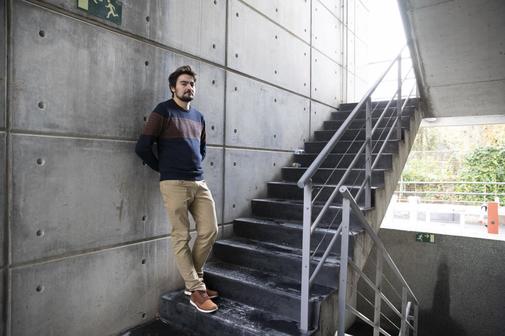Argentine reporter Martín Caparrós, in Lacrónica (Chalk Circle), argues that the genre of the chronicle consists of "telling something instead of realizing it, moving from the nondescript description to the story ." Emilio Gancedo (León, 1977) must keep this axiom in mind because his literature springs from journalistic synthesis, narrative poise and the precise lexicon.
Tanned for two decades as editor of the Diario de León , Gancedo is part of a literary generation that has decided to push the tooth into recent history, focusing on rurality . He did it in Palabras mayor (Pepitas de Calabaza), a compendium of interior stories crouched around the incalculable value of the custodians of the territory. And he credits it again in his novel La Brigada 22 , also edited by this independent publisher based in Logroño. " I am interested in the losers of History, the people who stay in the gutter, " Gancedo says to EL MUNDO.
The fable of La Brigada 22 is situated in 1980, on the eve of the coup d'etat. His two protagonists are Paquito Munera, a gray office worker with a bland existence in the company of his mother and whose only ambition is to publish letters in the newspaper of the province, and Lieutenant Aníbal Tosantos. For different avatars, both find a group of maquis anchored in the Mediterranean mountain range and years-old ideals. "We have been here for so long that the landscape has become for us an even more real skin than the one we were born with, " says Perdigones, one of the brigadistas.
Inspired by Los moles (1977), the book in which journalists Manu Leguineche and Jesús Torbado rescued the resistance of the Republicans who remained hidden during the dictatorship, the story of La Brigada 22 is permeated by a tender and deep humor that channels the argument from tragedy to comedy.
Gancedo especially noted the testimony of Pablo Pérez Hidalgo, aka Manolo el Rubio , arrested in Ronda on December 9, 1976, according to a teletype from the extinct Cifra agency. Leguineche and Torbado considered him "the last guerrilla fighter" and recorded his words: "They accused me on some occasions that I had burned convents. It's a fat lie ." He decided to hide even after Franco's death, which is explained by the double repression to which the maquis were subjected. The regime treated them like criminals and the PCE persecuted them by order of Stalin. Historians like Secundino Serrano, author of Maquis. History of the anti-Franco guerrilla (Topics of Today), have explored in depth the footprint of the communist and anarchist guerrillas In line with this past, Gancedo reflects on the difficulty of the Spaniards to heal their wounds. He writes: "This seems to be the only country in the world where wars never end and the conflict is always deaf and perpetual, an endless duel, where every scream from the past seems to echo in a new one. But the great pity of this land is how he treats those children who decide to give the skin for her. "
In his opinion, " the two Spain is more a myth than a reality , but it is true that this country fights daily for its past. Some live with constant lament and others do very well as a political weapon."
His prose, truffled by characters that exude loneliness, radiates a restlessness for the landscape and a special nose to capture a language that can only be heard treading the land . "Looking back at that forgotten landscape and landscaping would help rediscover ourselves. We are living through a brutal stage of dehumanization. There are many people who no longer look for sale. We are all day stuck in the screens."
This inclination for the beauty outside the city walls arises from the literary sources from which he drinks: Sampedro, Aldecoa, Ferlosio. Also Julio Llamazares , Leon as Gancedo, father of rural literature. Cernuda wrote in Ocnos : "There are human destinations linked to a place or a landscape." The virtue of the author of Major Words is that he maps the field from the ethnographic prism. "Now we study a lot what they did in Atapuerca, which seems good to me, but nothing what our grandparents did. We have gone from the Neolithic to the Internet. That has tremendous narrative potential, but a good part of the heritage has been carried forward. The Destruction of rural culture is one of the greatest catastrophes in the recent history of our country . And if it has to die, at least, let's make it a dignified burial. "
Despite having jumped on the political agenda, Gancedo sees "complicated" mitigate population bleeding in rural Spain . "The brambles eat the abandoned villages. A lady from Cuenca told me: 'all they want is for us to die of disgust.' Hopefully now a state pact is put together, but we must bear in mind that the roots weigh more than subsidies. " In his opinion, depopulation is a "decivilizing" process. Therefore, he concludes, "the eagerness to do something for your land is much more important than money . "
According to the criteria of The Trust Project
Know more- literature
- culture
- Spanish Civil War
Culture Juan Gómez-Jurado: "The life of a writer is like that of a soldier: 90% boredom and 10% pain"
Literature Fernando Aramburu: "The strange thing was that in Spain the extreme right had not yet awakened"
The Sphere of Paper Victoria Kent, Gabriela Mistral and Victoria Ocampo: pioneers of feminism ... and the 'queer'

